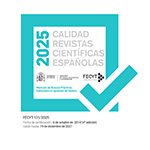Lust, Gender, and Terror: The Construction of Russian Nihilism in Spain´s fin de siécle liberal press
Abstract
This essay discusses the construction of a cultural vision of Russian nihilism in the Spanish liberal press following the assassination of Alexander II in 1881, identifying the codified metaphoric context of texts and suggesting their possible political and social applicability to the local panorama of the Restoration period. The article points out the ways in which reports of Russian revolutionary events masqueraded a discussion of national issues and contemporary debates concerning political and social modernization, gender, women´s access to higher education, national identity, and Spain´s place in the European context. The exploration highlights the malleable boundaries separating the press and the literary realm in the late nineteenth century, and provides a transnational panorama beyond theoretic postulates of how the depictions of foreign circumstances, issues, and another country´s people and politics may have played a role in the distanced articulation of autochthonous cultural imaginaries.Downloads
Article download
License
In order to support the global exchange of knowledge, the journal Cuadernos de Historia Contemporánea is allowing unrestricted access to its content as from its publication in this electronic edition, and as such it is an open-access journal. The originals published in this journal are the property of the Complutense University of Madrid and any reproduction thereof in full or in part must cite the source. All content is distributed under a Creative Commons Attribution 4.0 use and distribution licence (CC BY 4.0). This circumstance must be expressly stated in these terms where necessary. You can view the summary and the complete legal text of the licence.











